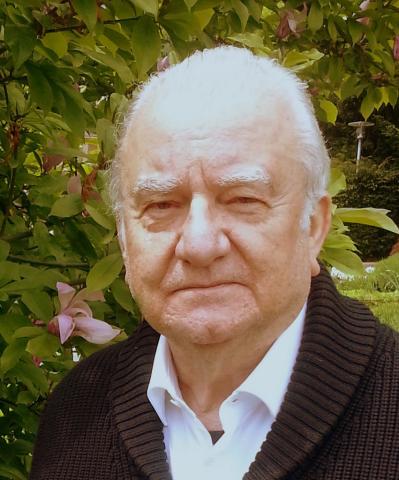Gerald J. Domingue, PhD
Professor Emeritus

Biography
Dr. Gerald Domingue is an American medical scientist/researcher (bacteriology, immunology, experimental urology) and academic who served as Professor of Urology, Microbiology, and Immunology in the Tulane University School of Medicine and Graduate School for thirty years and also as Director of Research in Urology. He is currently retired and resides in Zurich, Switzerland, where he is engaged in painting and creative writing. A portfolio of his work can be seen on his website.
At retirement, he was honored with the title of Professor Emeritus of Urology, Microbiology, and Immunology at Tulane (1967–1997). He was recruited to the Tulane faculty in 1967 with a full-time joint appointment in urology, microbiology, and immunology by the late professors/chairs, Jorgen U Schlegel, Morris F Shaffer, and Oscar Creech, Dean. In a departmental publication in 1997, it was revealed that Dr. Domingue was a model and exemplary teacher, having mentored doctoral students and postdoctoral fellows and students. Specifically, he has taught approximately 4,400 medical students, 200 graduate students, 300 urology residents, and mentored 26 postdoctoral fellows. He is a doctor of basic medical sciences, PhD, Tulane, and undergraduate Bachelor of Science in bacteriology with minors in chemistry and French, SLI. He was a postdoctoral research fellow in medical microbiology, immunology, and infectious diseases, State University of New York-Buffalo and The Children’s Hospital, mentored by the late eminent bacteriologist-immunologist, Prof. Erwin Neter. He has authored over 160 peer-reviewed publications (journal articles, abstracts, monographs, book, book chapters). Prior to Tulane, he served on the faculty of St. Louis University (School of Medicine), was a lecturer at Washington University (School of Dentistry), and Director of Clinical Microbiology in St. Louis City Hospital (Snodgrass Laboratory of Pathology and Bacteriology), St. Louis, Missouri.
Over the course of his forty-year career, Dr. Domingue had an enviable grant-funding record from the National Institutes of Health, Veterans Administration, The Hume Research Fund (Tulane Urology), and a variety of national and international research foundations. He served on grant review committees of these agencies and was a consultant to various journal review boards. He also served as clinical microbiology and research consultant to hospital clinical laboratories, infection control committees, and to industries. He has enjoyed international recognition as an authority on the basic biology and medical significance of atypical bacterial organisms (cell wall-defective) and is considered an expert pioneer on the role of these unusual bacteria in the persistence and expression of kidney and urological infectious diseases. He was a distinguished visiting professor and lecturer in many of the most prestigious universities and research institutes in North America, Western Europe, Australia, and Asia. Among his most coveted honors, Prof.Domingue was named a Fellow of the American Academy for Microbiology (1973) and a Fellow of the Infectious Diseases Society of America (1975). In 1995, he was knighted and received the prestigious Palmes Académiques Medal (Chevalier, Sir) from the country of France.
As an octogenarian in his 20th year of retirement, he is often solicited by international colleagues for advice and research perspectives on cell wall-defective bacteria in host-pathogen interactions and their role in persistence and expression of disease. He primarily devotes his time to painting and writing poetry in his Zurich studio and in Le Moulin, Dracey-les-Couches, his secondary country residence in the Burgundy region of France. His works are exhibited in Zurich, Paris, New York, Italy, and New Orleans and are in international private and corporate collections. Since retiring, he has also published three volumes: Memories of a Grandson (over 2000 pages) on the genealogy and history of his paternal and maternal families; a book of poems (Massaging the Intellect); a book of painting monographs; a book on the Domingue family residence (L’habitation Domingue, 1895-1963), and several painting catalogues.
Prof. Domingue has not only contributed to Tulane through his research, teaching, service, and financial support, but he has also been a local, national, and international ambassador for the university. The France-Louisiana ties he fostered were not only at the level of civic activities, but also at the level of strengthening ties between French institutions and the medical school at Tulane.
